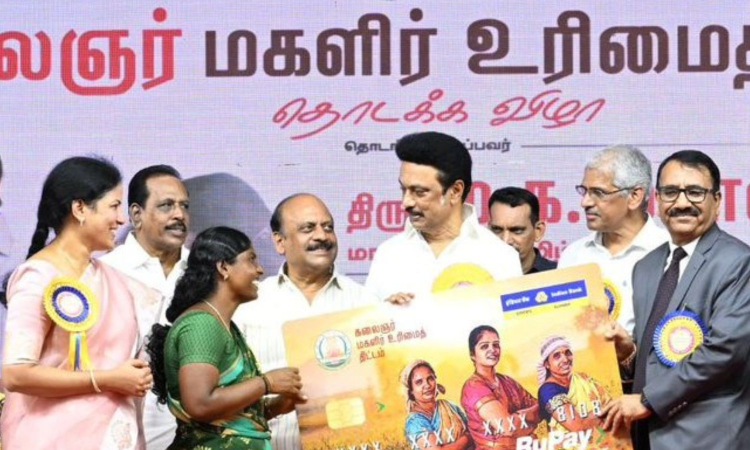Mother's Day Special: A look at Tamil Nadu’s comprehensive welfare framework for mothers
A glimpse into how successive governments in Tamil Nadu have created a diverse landscape of schemes aimed at safeguarding the health, dignity, and empowerment of mothers

From the launch of the Kalaignar Magalir Urimai Thogai scheme
CHENNAI: In Tamil Nadu, the cradle of the Dravidian movement and a pioneer in social welfare, motherhood receives not just reverence but robust state support. From cash transfers and nutrition programs to free public transport and baby care kits, Tamil Nadu’s schemes span both urban and rural geographies, and collectively form one of the most comprehensive safety nets for mothers in India.
Income with dignity
Launched in September 2023, the Kalaignar Magalir Urimai Thogai scheme under the DMK government provides a monthly assistance of Rs 1,000 to eligible women heads of families. More than just a financial incentive, the scheme embodies economic dignity and autonomy for women—many of whom are mothers juggling caregiving with household management. With over one crore beneficiaries enrolled, the scheme is a lifeline that contributes to family expenses, child education, nutrition, and small-scale economic activities.
A lifesaving legacy
One of the flagship maternal welfare schemes in Tamil Nadu, the Dr Muthulakshmi Reddy Maternity Benefit Scheme (MRMBS) extends financial assistance of Rs 18,000 to pregnant women. Instituted during the late 1980s and continuously expanded, the scheme incentivises antenatal care, institutional deliveries, immunisations, and postnatal check-ups. The disbursement is linked to key health milestones such as regular doctor visits, iron and folic acid supplementation, and vaccinations.
Healthy beginnings
Tamil Nadu has also taken significant strides in promoting breastfeeding. Through the Mother’s Absolute Affection (MAA) Programme—launched by the Union Ministry of Health and Family Welfare and implemented by the state—the focus is on encouraging exclusive breastfeeding during the first six months of life.
In parallel, the Baby Friendly Hospital Initiative (BFHI), launched in collaboration with UNICEF, designates hospitals that follow breastfeeding-supportive practices—from initiating breastfeeding within one hour of birth to not promoting breast milk substitutes. Over 600 hospitals in the state are sensitised under BFHI and ongoing training modules for nurses and doctors.
A practical gift for new mothers
Introduced under the AIADMK regime in 2015, the Amma Baby Care Kit has become one of the most beloved schemes among new mothers. Distributed free of cost to mothers who deliver in government hospitals, the kit contains essential items such as baby clothes, soaps, a baby mattress, mosquito net, towels, and a plastic cradle. Apart from easing post-delivery care, the scheme indirectly promotes institutional deliveries and hygiene practices. Though born out of a different political regime, the DMK government has continued the scheme.
Mobility for mothers
Since 2021, women across Tamil Nadu have been able to travel free of cost in state-run town buses, thanks to another DMK initiative aimed at economic empowerment. While the scheme is universal, working mothers, caregivers, and those making frequent hospital or school visits particularly benefit from the reduced financial burden. This mobility boost translates into higher access to healthcare, markets, and public spaces, enhancing mothers’ participation in both family and community life.
A response to female infanticide
Pioneered in the 1990s by the then Chief Minister J Jayalalithaa, in response to rising female infanticide in western Tamil Nadu, the Cradle Baby Scheme allows mothers to anonymously leave infants—especially unwanted girls—in designated cradles maintained by the government. Though controversial initially, the scheme is credited with saving thousands of lives. Over time, the cultural stigma around the girl child has reduced, but the cradle facilities remain as a safety net.
Nurturing maternal health
The state’s Anganwadi centres under the Integrated Child Development Services (ICDS) scheme provide supplementary nutrition to pregnant and lactating mothers. Weekly health check-ups, growth monitoring, and take-home ration kits help ensure better maternal health outcomes. Meanwhile, the Noon Meal Scheme—though targeted at school children—offers indirect relief to mothers by guaranteeing at least one nutritious meal a day for their children. Initiated by MG Ramachandran and expanded by successive governments, it is an integral part of Tamil Nadu’s welfare DNA.
Transforming mothers to entrepreneurs
Through the Tamil Nadu Corporation for Development of Women (TNCDW), lakhs of women—many of them mothers—are organised into Self-Help Groups (SHGs). They receive training, micro-credit, and market access under schemes like Pudhu Vaazhvu Project and the Tamil Nadu Urban Livelihood Mission. These SHGs promote savings habits, entrepreneurship, and community leadership, transforming mothers into micro-entrepreneurs and decision-makers in their families.



